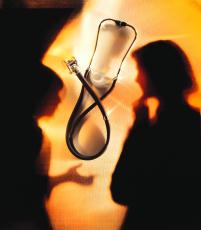National Institutes of Health
- The primary NIH organization for research on Bipolar Disorder is the National Institute of Mental Health
 A service of the U.S. National Library of Medicine
A service of the U.S. National Library of Medicine  National Institutes of Health
National Institutes of Health
Bipolar disorder is a serious mental illness. People who have it go through unusual mood changes. They go from very happy, "up," and active to very sad and hopeless, "down," and inactive, and then back again. They often have normal moods in between. The up feeling is called mania. The down feeling is depression.
The causes of bipolar disorder aren't always clear. It runs in families. Abnormal brain structure and function may also play a role.
Bipolar disorder often starts in a person's late teen or early adult years. But children and adults can have bipolar disorder too. The illness usually lasts a lifetime.
If you think you may have it, tell your health care provider. A medical checkup can rule out other illnesses that might cause your mood changes.
If not treated, bipolar disorder can lead to damaged relationships, poor job or school performance, and even suicide. However, there are effective treatments to control symptoms: medicine and talk therapy. A combination usually works best.
NIH: National Institute of Mental Health
References and abstracts from MEDLINE/PubMed (National Library of Medicine)
